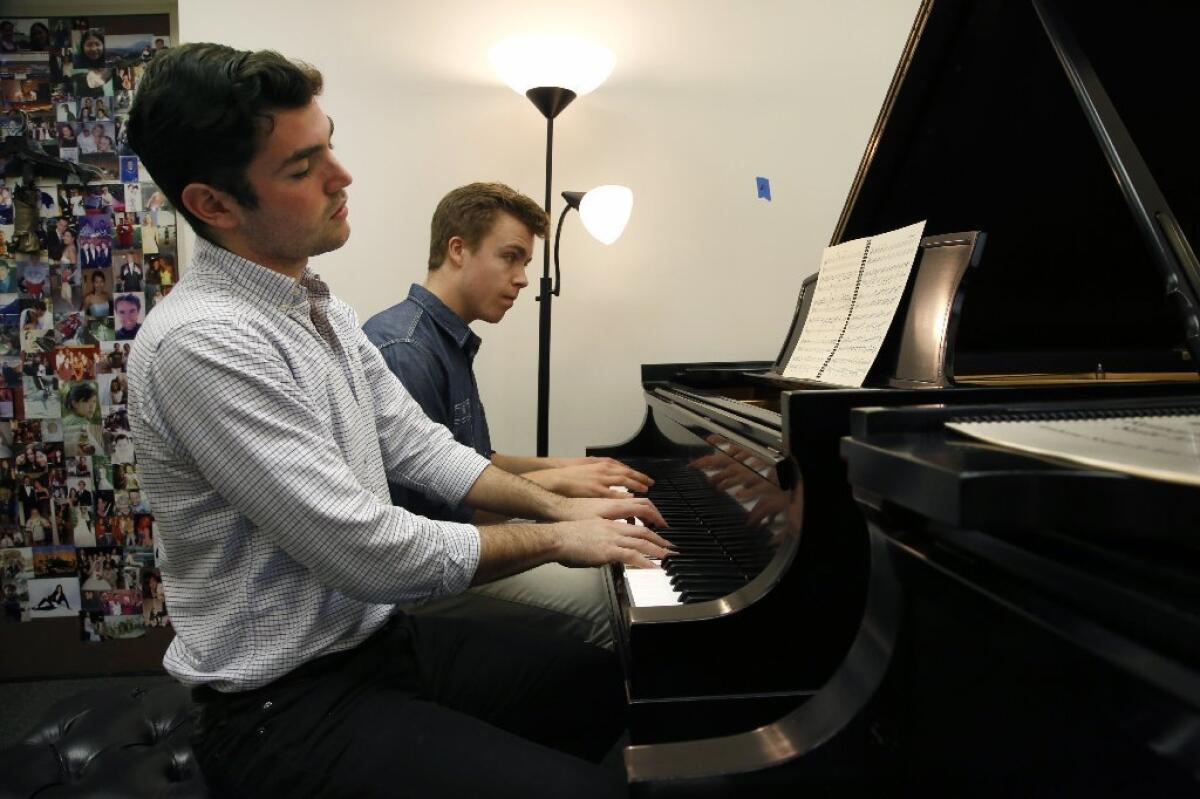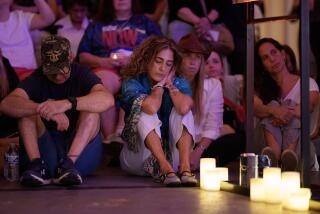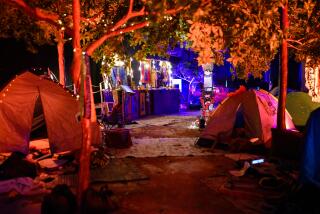USC students to perform at 70th anniversary of Auschwitz liberation

It started with a single voice, Italian opera singer Lucia Amato singing a traditional Jewish folk melody while she was imprisoned in the Auschwitz-Birkenau concentration camp in Poland during World War II.
Ambrose Soehn, a student working at the Shoah Foundation at the University of Southern California, heard a clip of her song and thought it could provide inspiration for a piano suite he was composing with classmate and co-worker Alex Biniaz-Harris in commemoration of the 70th anniversary of the liberation of Auschwitz.
The students will perform their composition, “Remembering Auschwitz: Suite for two Pianos,” at a gathering of survivors in Krakow, Poland, on Monday. The camp was liberated on Jan. 27, 1945, by troops from the Soviet Union.
Soehn, 22, and Biniaz-Harris, 21, originally thought their composition would be used in a Shoah Foundation documentary. But they were asked to take the place of violinist Itzhak Perlman at the Krakow gathering when Perlman was unable to attend.
Both feel an enormous responsibility in the task.
“It’s our job as young people to educate other young people about the ills of genocide,” says Biniaz-Harris.
In combing through the video clips in the Shoah Foundation’s archives, the two seniors discovered that music was often one of the tender, human things that helped keep people alive in the camp, where an estimated 1.1 million prisoners died between 1940 and 1945.
“We used to sing and cry all the time,” Amato says in the interview after she sings her song.
There is an extra layer of meaning for Biniaz-Harris because his grandmother, Celina, is an Auschwitz survivor and will be at the ceremony accompanied by Biniaz-Harris’ mother, Sue Biniaz.
“My grandmother didn’t tell her story about her experiences of the Holocaust until 50 years later,” says Biniaz-Harris. “She was guarding and protecting me and the rest of my family because she didn’t want us to carry a sense of guilt for the atrocities she witnessed.”
Their composition has three movements. The first, titled “Exodus,” was composed by Soehn.
“It basically falls apart at the end and parallels what happened when all of these normal people, living their daily lives, were ripped away from their homes and transported to the concentration camp,” explains Soehn.
The second part was composed by Biniaz-Harris and is called “Ashes to Earth.”
“It’s a flowing musical movement representing the crematorium exploding into the sky and ash falling back down to earth,” says Biniaz-Harris.
Both men composed the third movement, “Inner Refractions.”
“It represents that people walked away from the Holocaust but were haunted by ghosts for a long time,” says Biniaz-Harris.
Biniaz-Harris, of Washington, D.C., is a double major in keyboard studies at the USC Thornton School of Music and marketing and entrepreneurship at the USC Marshall School of Business. Soehn, of Boulder, Colo., is a neuroscience major at the USC Dornsife College of Letters, Arts and Sciences and a keyboard studies minor at USC Thornton.
The two will be joined at the ceremony by teachers and students who were chosen via an international contest led by Discovery Education and the Shoah foundation.
Biniaz-Harris and Soehn will open the ceremony. More music will follow, including selections from the score for the film “Schindler’s List.” That film’s director, Steven Spielberg, will deliver the night’s closing remarks.
Twitter: @jessicagelt
More to Read
The biggest entertainment stories
Get our big stories about Hollywood, film, television, music, arts, culture and more right in your inbox as soon as they publish.
You may occasionally receive promotional content from the Los Angeles Times.











